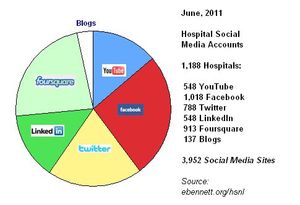Ed Bennett runs a website to track how hospitals in the United States use social media. He and his team have identified 3,952 social networking sites coordinated by 1,188 hospitals. The breakdown is revealing:

While I had expected a large presence on Facebook and Twitter, the prominence of Foursquare surprised me. This service allows users with mobile devices to “check in” at a particular location.
The analysis of social networking can go even deeper. While Bennett calculates the presence of a Facebook page, for instance, UbiCare explores how much the target audience engages with the site. To achieve a high engagement score, a hospital typically adds over 7 posts a week.
While hospitals tend to target their communications at an external audience, faculty developers can learn from their techniques to reach internal stakeholders.